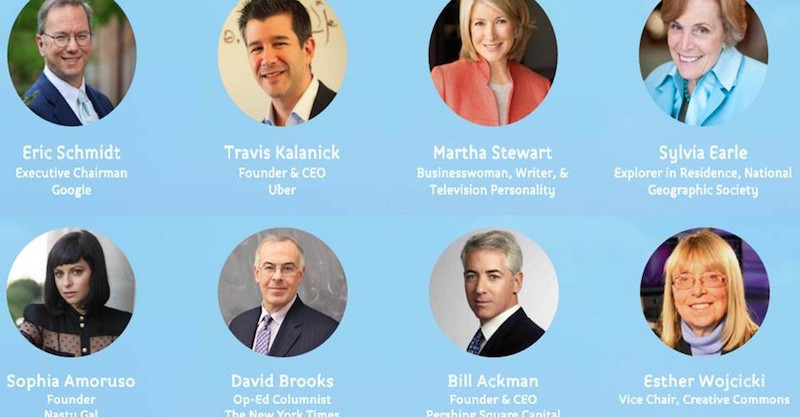Over the weekend, I boarded a ship in Miami with over 2,000 creatives, tech millionaires, celebrities and startup founders for a three-day, invite-only “conference / festival” called Summit at Sea.
In the company of Martha Stewart, John Legend, Harry Belafonte, Blake Mycoskie and the list goes on, I spent the weekend connecting with some of the leading social impact entrepreneurs in the world.
There were a lot of conversations and experiences that I took away from the weekend, but there was one in particular that I want to share today.
On our last night on board, I walked down to one of the bars on the ship by myself. (The great thing about this event was that you couldn’t go more than 30 seconds without someone saying hello and introducing themselves. For better or worse, you never felt alone.)
“I love your dress,” said a blonde-haired woman in her early forties, standing next to me at the bar.
I told her I bought it second-hand and we started chatting about thrift shopping before getting into other topics, ranging from Burning Man to the challenges that minority entrepreneurs face.
It wasn’t until 30 minutes into the conversation that she told me who she was:
A serial entrepreneur who has sold three companies for over 30 million dollars — each.
Upon realizing that I was having a one-on-one conversation with someone as successful as she was, I found myself starting to shrink.
Who was I to be taking up so much of her time?
What could I possibly say that would be interesting to her?
What was I doing here?
I mean, really, who invited me on this damn boat?
My doubts were creeping in, I was feeling like a fraud and I sensed that in any minute, she would excuse herself from the conversation.
“Do you ever get imposter syndrome?” I asked before I could stop myself.
“Oh my gosh, all of the time,” she said.
“Really? Does that feeling ever go away?”
“You know what, you fake it until you make it — and you never actually feel like you make it. I’ve sold three companies and have more money than I’ll ever need, but I still question the validity of my success.”
Instead of the conversation slipping away like I had imagined, we talked for another 30 minutes.
She opened up and told me what it was like to raise venture capital as a woman. We started talking about how we can collectively build each other up as female founders.
The conversation shifted to a place where I no longer felt inferior — I felt empowered. And it was because we were able to relate on a human level.
I realized over the weekend that this was the biggest takeaway.
As people on the “outside,” we can tend to build others up to be…
Larger than life.
I imagined the founders of companies like Google, Warby Parker, Life is Good and TOM’s to have it all together.
Articulate public speakers. Impeccably dressed. Perfectly-trained socializers.
We see power, money and success and automatically put them on a pedestal that raises them above the rest.
And while, yes, their accomplishments are generally unparalleled, our weekend together humanized everyone around me.
(Except for maybe Martha Stewart.)
The founder of Zappos was humble (and hungover) on stage. The founder of Uber was soft spoken and unassuming. Even John Legend was modest and quiet.
Maybe they weren’t all experiencing imposter syndrome, but I don’t think anyone would deny the experience of feeling uncertainty and unworthiness.
It doesn’t matter how much success you’ve seen, how much money you have, or how great your life appears to be on the outside.
We’re all just a bunch of humans doing the best we can.
Having come off of the mental and emotional high of this weekend, I’m challenging myself to appreciate where I am right now while truly believing that what I’ve done is enough.
Regardless of whether you have started your company, are currently in business or are still waiting for the right time to start, I’d encourage you to join me in this.
You are worthy. You have done enough. And you are exactly where you need to be.
When you start to doubt yourself remember that so much of the success of others was based on one overarching fact:
They didn’t stop moving forward — even when they doubted themselves. Or felt like frauds.
They kept putting one foot in front of the other.
Whether it felt like the foot of an imposter or not.



